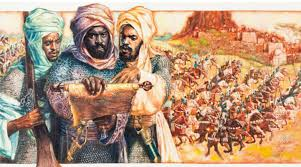Introduction
Tucked away in the heart of Central Africa, the Kanem-Bornu Empire stands as one of Africa’s most powerful and influential medieval empires. Spanning several centuries, from the 9th century to the 19th century, this empire was known for its military prowess, prosperous trade networks, and rich culture. The Kanem-Bornu Empire not only shaped the history of Central Africa but also played a crucial role in the broader narrative of African and world history. Let’s journey back to explore the rise, peak, and lasting legacy of the Kanem-Bornu Empire.
The Origins of the Kanem-Bornu Empire

The Kanem-Bornu Empire emerged as one of the most influential empires in Central Africa. Its story begins in the Saharan region, long before its eventual prominence in the central Sahel.
The Founding of the Kanem Kingdom
The empire’s history can be traced back to the 9th century when the Kanem Kingdom was founded around Lake Chad. Early Kanem rulers, known as the Sayfawa dynasty, established a stronghold in this strategic location, building the foundation for future expansion.
The Role of Islam in Kanem’s Formation
Islam began to spread across the region by the 11th century, with many of Kanem’s rulers adopting the religion. This shift greatly influenced the kingdom’s political and cultural developments.
The Expansion of the Kanem-Bornu Empire
By the 12th century, the Kanem Kingdom had expanded its influence beyond Lake Chad, becoming a dominant force in the region.
The Birth of the Bornu Empire
The shift from the Kanem Kingdom to the Kanem-Bornu Empire occurred around the 14th century. The Bornu region, located to the west of Kanem, became increasingly significant in the empire’s growth, especially after internal conflict led to the relocation of the capital from Kanem to Bornu.
Territorial Expansion and Military Success
The Kanem-Bornu Empire expanded its territory through a combination of military conquests, strategic alliances, and control of vital trade routes across Central and West Africa.
The Kanem-Bornu’s Trade Networks
Trade was at the heart of the Kanem-Bornu Empire’s success, contributing to its wealth, influence, and longevity.
Strategic Position along Trade Routes
Located between the Sahara and sub-Saharan Africa, Kanem-Bornu was strategically positioned along key trans-Saharan trade routes, facilitating the exchange of salt, gold, ivory, and slaves.
Trade with North Africa and Beyond
The empire’s trade extended as far as North Africa, the Middle East, and even Europe. Kanem-Bornu acted as a bridge between the Islamic world and sub-Saharan Africa, fostering cultural and economic exchanges.
The Kanem-Bornu Society and Culture
The Kanem-Bornu Empire was home to a rich and diverse society, blending indigenous traditions with influences from Islam and other African cultures.
The Sayfawa Dynasty
The Sayfawa dynasty, the royal family of Kanem-Bornu, played a crucial role in shaping the empire’s political and religious landscape. The dynasty maintained a strong presence for over a millennium, cementing its legacy The Role of the King (Mai)
The king, or Mai, was central to the empire’s governance. The Mai was both a religious leader and a political ruler, with the power to enforce law, lead military campaigns, and promote Islam.
The Influence of Islam on Kanem-Bornu
Islam’s influence permeated many aspects of the empire, from governance to culture and trade.
Islamic Governance
As the Kanem-Bornu Empire embraced Islam, the laws of the empire began to reflect Islamic principles. Sharia law was often enforced, particularly in areas like commerce, family matters, and criminal justice.
The Islamic Golden Age in Kanem-Bornu
During the 14th and 15th centuries, the empire experienced a cultural golden age, marked by the construction of mosques, the establishment of schools, and the flourishing of scholarship, particularly in areas like astronomy and mathematics.
Military Prowess of the Kanem-Bornu Empire
The military strength of the Kanem-Bornu Empire was one of its most defining features, enabling it to expand and maintain its dominance.
The Elite Cavalry
The Kanem-Bornu military was renowned for its cavalry, which was one of the most advanced in Africa at the time. The cavalry played a crucial role in the empire’s military campaigns and in defending the empire’s vast territory.
Advanced Military Tactics
The empire employed advanced military tactics, including swift cavalry raids and the use of well-organized forces. Their ability to mobilize and conduct warfare efficiently contributed to the empire’s long-lasting success.
Decline and Fall of the Kanem-Bornu Empire
Despite its impressive growth, the Kanem-Bornu Empire eventually declined, influenced by internal strife and external pressures.
Internal Struggles
In the 16th century, internal conflicts weakened the empire, particularly after the death of a powerful ruler and the resulting power struggles. These conflicts made the empire vulnerable to external threats.
The Impact of European Colonization
By the 19th century, the rise of European colonial powers in West and Central Africa also contributed to the weakening of the empire. European interventions and the increasing presence of European trade routes diminished the influence of Kanem-Bornu.
Also Read: This Summer Work Abroad Program Lets You Explore the US & Build Your Resume
The Legacy of the Kanem-Bornu Empire
Though the Kanem-Bornu Empire eventually fell, its legacy continues to impact the region and the world.
Cultural and Religious Influence
The empire’s embrace of Islam and its promotion of learning left a lasting cultural legacy, particularly in the spread of Islamic scholarship across Central Africa.
Lasting Influence on Modern Africa
The historical influence of Kanem-Bornu is still felt today, particularly in Chad, Niger, Nigeria, and Cameroon, where the empire’s political and cultural systems have had a lasting impact.
Rediscovering the Kanem-Bornu Empire
Recent archaeological discoveries and historical research are shedding light on the empire’s past and its impact on Africa’s medieval history.
Archaeological Sites
Excavations in regions like Lake Chad and the Kanem area have uncovered ruins of palaces, mosques, and ancient fortifications, providing valuable insights into the empire’s former glory.
Historical Documents and Texts
Historical texts, many written by travelers and scholars from the Islamic world, provide a detailed record of the empire’s governance, military prowess, and cultural achievements.
Why the Kanem-Bornu Empire’s Story Matters
The story of the Kanem-Bornu Empire offers vital lessons about African power, resilience, and the importance of trade, culture, and governance in shaping civilizations.
Celebrating African Heritage
The Kanem-Bornu Empire is a testament to the rich history of Central Africa, showcasing the empire’s enduring impact on the development of Africa’s civilizations.
Lessons for Future Generations
The rise and fall of the Kanem-Bornu Empire remind us of the importance of unity, governance, and sustainable trade practices in ensuring the longevity of any civilization.
Conclusion
The Kanem-Bornu Empire stands as one of Africa’s greatest historical achievements. From its military prowess and vast trade networks to its cultural and religious influence, this medieval empire’s legacy continues to shape Central Africa today. The Kanem-Bornu Empire not only highlights the richness of African history but also provides a reminder of the interconnectedness of civilizations across the globe.
FAQs
Q1: What was the Kanem-Bornu Empire?
The Kanem-Bornu Empire was a powerful medieval empire located in Central Africa, known for its military strength, vast trade networks, and rich cultural heritage.
Q2: When did the Kanem-Bornu Empire exist?
The empire existed from the 9th century to the 19th century, with its peak during the 14th and 15th centuries.
Q3: What role did Islam play in the Kanem-Bornu Empire?
Islam greatly influenced the empire’s governance, culture, and trade, with Islamic law being integrated into its political system.
Q4: Why did the Kanem-Bornu Empire decline?
Internal conflicts, power struggles, and external pressures, particularly from European colonization, led to the empire’s decline.
Q5: What is the legacy of the Kanem-Bornu Empire?
The Kanem-Bornu Empire’s legacy includes its cultural and religious influence, particularly in the spread of Islam and Islamic scholarship across Central Africa.


